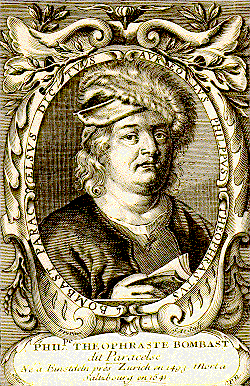 |
 |
 |
 |

Little is known of Theophrastus Bombastus von Hohenheim, who took the name Paracelsus for himself. He was the son to a physician, and at the age of sixteen entered Basel University where he studied alchemy. He later worked in the mines at Tirol, where he gained first-hand knowledge of the properties of metals.
By his early thirties he had become famous as a physician in Basel, where he gave lectures on medicine. His disputes with the authorities in 1528 were symptomatic of his abrasive and arrogant disputing style, and led to his expulsion from Basel. In the last year of his life he settled in Salzburg.
He argued that human life could be created through alchemy, and believed in the long-sought-after elixir vitae as a means of infinitely prolonging life free from disease. His lasting contribution to science is the rejection of Galen's humoral theory of illness.
Percy Bysshe Shelley listed Paracelsus (along with Agrippa) among his favorite writers in a discussion with Godwin in 1812.